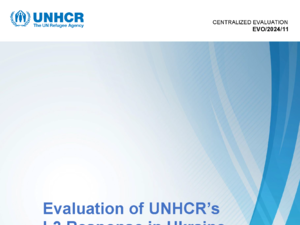Evaluation of UNHCR's multi-country L3 Emergency Response to the Sudan Situation
Evaluation of UNHCR's multi-country L3 Emergency Response to the Sudan Situation
EVO/2025/02

Executive summaries & briefs
Purpose & approach
This policy-mandated evaluation was triggered by the declaration of the L3 emergency on 6 July 2023 and covers four countries: Chad, Egypt, South Sudan and Sudan.
The evaluation documents achievements, challenges, lessons, good practices, future positions and adaptation required to further strengthen UNHCR’s programming, response and advocacy to the Sudan Situation and future emergency responses.
In addition to the Office of the Regional Refugee Coordinator (RRC) at RB EHAGL, the Division of Emergency, Security and Supply, and the Division of International Protection, key non-UNHCR stakeholders involved in the response were also invited to join the reference group for this evaluation. These included representatives from Members States such as Canada and France; the Office of the UN Resident Coordinator in Sudan, UNICEF and an NGO coalition (ICVA).
The objectives of the evaluation are the following:
- Strengthen the design of UNHCR’s emergency response operations globally and in Chad, Egypt, Sudan and South Sudan.
- Improve the results for forcibly displaced and stateless persons globally and in the focus countries – through an analysis of the engagement, partnerships and results of UNHCR’s activities as part of a broad, inter-agency effort.
- Help UNHCR plan for and support the transition towards medium and longer-term solutions for refugees, with particular attention to the engagement of development actors in the three regions: West and Central Africa (WCA), Middle East and North Africa (MENA) and East and Horn of Africa and Great Lakes (EHAGL).
Conclusion
- UNHCR delivered contextually relevant emergency interventions based on the needs of forcibly displaced and stateless persons and simultaneously rapidly incorporated the HDP nexus approach to ensure a long-term strategic approach, although the results of this have not yet materialized.
- UNHCR demonstrated capacity to scale up, deliver and steer a timely and relevant regional response in a very challenging context although these challenges are expected to persist, especially underfunding.
- The scale of the UNHCR response was hindered by insufficient funding, which highlighted the challenges of how best to prioritize programmatic interventions in a resource scarce environment.
- Investment in the RCM rendered coordination generally effective, although inconsistent participation and its coexistence with other coordination mechanisms raised questions about the appropriateness of its roll-out in some countries. The newly released 2024 RCM guidance is expected to address some of these gaps.
- Some data gaps and insufficient analysis by UNHCR hindered strategic, programmatic and operational decisions-making related to the design of interventions, the prioritization of the response and accountability to aid recipients, donors and partners.
- UNHCR worked well regionally across three regional bureaus providing technical resources and expertise to the COs albeit raising some interoperability issues.
Recommendations
The five recommendations put forward by the independent evaluation team represent transformative opportunities for UNHCR to move the dial in the Sudan Situation response and beyond.
Most of the proposed measures are geared towards structural and systemic change, making UNHCR an organization that can better prioritize applying a sustainable response approach amidst a very acute system-wide financial crisis, effectively monitoring and learning from its performance for strengthened decision-making and donor reassurance, and better coordinating with other actors in a clearer and streamlined fashion. For each of the high level recommendations below, the evaluation team provides a number of concrete suggestions on operationalization.
Recommendation 1
UNHCR should expand minimum requirements for monitoring to ensure that they are the same across all forms of material assistance provided by UNHCR to ensure inclusive and results-driven responses, with a focus on regular data collection, real-time analysis and effective communication with affected populations.
Recommendation 2:
UNHCR should strengthen its approach to prioritization by establishing, within its planning and programme development procedures, clear criteria and procedures to prioritize sectors, activities, modalities and vulnerable populations in order to justify the allocation of resources and to inform operations for the Sudan Situation as well as future L3 emergencies. This applies to UNHCR as coordinator of the response as well as UNHCR as last-resort provider in emergency as well as non-emergency settings.
Recommendation 3:
UNHCR should invest in the roll-out and implementation of the new RCM Guidance to improve aspects related to the participation in the RCM, the RRRP process, and the interactions with other coordination mechanisms in mixed settings.
Recommendation 4:
UNHCR should further integrate resilience and sustainable responses in the design of L3 scaled-up responses, notably via the selection of response modalities at area level, to better address the long-term needs of acute crises from the outset through the nexus approach.
Recommendation 5:
UNHCR should capitalize on the cross-regional ways of working put in place for the Sudan situation (contingency planning, cross-border operations and regional communication plans) so that good practices and lessons learned can be adopted in future L3 responses.
Management response
The Management Response is due on 30 June 2025 and will be added to this page when available.
Listen to the podcast
A podcast to accompany the report is available on YouTube in English, French and Arabic.
Disclaimer: Both the voice synthesis and transcripts for the English version of this podcast have been generated using AI technology.
📅Evaluation timeline
- 30 June 2025
Management response due and external publication - 3 June 2025
Briefing with Member States - 1 April 2025
Report shared with Senior Management and internal dissemination - December 2024 - March 2025
Reporting and data analysis - August - November 2025
Data collection - February 2024
Initiation of the evaluation

